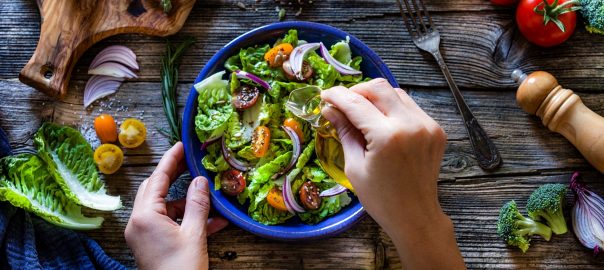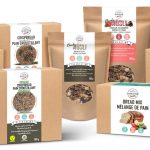
Low Carb Diets & Fibre
Why is Fibre Important on a Low Carb Diet?
Learn why fibre can benefit your health and progress towards weight loss.
Disclaimer: The information in this article is not intended to replace personalized medical advice. A low carb diet may not be suitable for you. Consult your health care provider before making any changes to your lifestyle or use this information at your own risk.
Fibre is technically a carb, but you don’t need to avoid it on a low carb or ketogenic diet! And thankfully so, because fibre is such an essential component of any diet. Today we’re covering why people often skip fibrous foods on a low carb or ketogenic diet and how this can actually be detrimental not only to their weight loss progress, but also their health in general. So, grab a bowl of greens and keep on reading!
What is Fibre?
Fibre is a type of carbohydrate, like sugars and starches. However, unlike these “simple” carbohydrates, fibre is considered a “complex” carbohydrate because it is not broken down by the body into glucose. Fibre is actually not digested by the body, but rather it assists the digestive system to help everything else (including potentially harmful waste) to pass through smoothly. In addition, fibre contains no calories and does not hold any nutrients, yet it is still a crucial part of our diets.
Fibre can only be obtained from plant foods; it is not found in any animal products including dairy. The most amount of fibre is found in the skins and outer casings of fruits, vegetables, nuts and seeds.
Types of Fibre
There are two types of fibre: soluble and insoluble.
- Soluble Fibre – dissolves in water in our digestive systems, creating a gel-like substance that traps certain components of foods, such as sugar and LDL (“bad”) cholesterol, making them more difficult for the body to absorb.
- Insoluble Fibre – does not dissolve in water, but rather absorbs it and increases in size. This provides bulk and moisture to the digestive system, which helps it act as a natural laxative. Bulkier stools are more effective at cleaning out the walls of the intestines and promoting colon health.
Why do We Need Fibre?
Fibre helps our digestive systems to function properly. A well-functioning digestive system may sound trivial, but it is the key to a healthy mind and body. Think about it – the way our bodies receive nutrients in order to function and survive is through our stomachs! There is also a big connection between the brain and the gut, which facilitates the production of hormones and neurochemicals. These are the primary chemical messengers that tell other parts of our bodies how to function from day to day, and how to grow and repair themselves. Basically, fibre helps ensure that you are getting all the good stuff from your diet and keeping out the bad stuff – such as sugars and LDL cholesterol.
Below is a more in-depth look at some of the benefits of fibre!
1. It keeps you full.
Fibre slows digestion and provides volume to fill our stomachs and signal fullness to our brains. As a result, we feel fuller for longer when we eat fibre-rich foods. This is a great way to curb appetite while staying within your desired caloric intake, since high-fibre foods also tend to be low in calories and high in nutrients that make us feel satiated.
2. It regulates blood sugar levels.
Certain types of fibre trap sugar, which prevent it from being absorbed into the blood stream. Blood sugar levels are important to monitor if you suffer from diabetes or insulin resistance. However, even if you do not have either of these conditions, it is still a good idea to prevent high blood sugar levels. Not only can this lead to energy spikes and crashes that can leave us feeling irritable or lethargic, but sugar also wreaks havoc on the body. It can damage our vital organs and lead to malfunctioning or deterioration over time. Things like Alzheimer’s disease, cardiovascular disease, kidney damage, vision problems and bone and joint problems are all more common with high blood sugar levels.
3. It keeps your bowel movements regular.
By absorbing water and adding bulk to our stools, fibre helps things move through the digestive system easily. If you don’t eat enough fibre regularly, you can become constipated which is not good for colon health and can cause a number of physical discomforts. In addition, this doesn’t allow waste products to be excreted from the body, and if they remain in the body for too long they can become toxic or harmful. These toxins can not only damage your internal organs, but they are also usually reflected in our largest external organ – the skin.
The cumulative benefit of fibre is that it can help you maintain a healthy body weight. By keeping you full longer so you avoid excessive snacking, keeping your blood sugar at healthy levels, and promoting regular bowel movements, you are more likely to look and feel your best. Plus, although fibre itself contains no nutrients, foods that are rich in fibre provide a host of essential vitamins and minerals for optimal functioning of the body and disease prevention!
Fibre on a Low Carb Diet
Luckily, most high fibre foods are safe for a low carb diet, with the exception of fruits and whole grains. Depending on how many carbs a day you eat on your version of a low carb diet, you may still be able to include low glycemic fruits such as berries, cherries, grapefruits and pears but, in general, grains are off limits for low carb dieters.
Otherwise, some more great low carb, high fibre foods include:
- Leafy greens
- Brussels sprouts
- Cauliflower
- Broccoli
- Asparagus
- Celery
- Cucumber
- Zucchini
- Cabbage
- Avocado
- Chia seeds
- Flax seeds (ground for best nutrient absorption)
- Unsweetened coconut meat
- Nuts (especially almonds, pistachios and pecans)
- Psyllium husk fibre
- Oat fibre
- Almond flour
- Coconut flour
It is a good idea to leave the skins on your produce as these contain the most amounts of fibre. Also, stay away from green juices as these omit the most fibrous part of fruits and vegetables and basically just leave you with sugar and water.
In addition to the above whole food sources, you can also check out some of our customers’ favourite high-fibre products that make getting your daily fibre in more convenient and tastier!
- KZ Clean Eating High Fibre Crispbreads and Breakfast Cereal
- Baker’s Deluxe Superflax Bread – with 5g of fibre per slice
- Catalina Crunch Keto Breakfast Cereals – available in flavours nostalgic and crave-worthy flavours such as Graham Cracker and Maple Waffle!
- Lily’s No Sugar Added Chocolate – with added chicory root fibre for 8-14g of fibre per serving!
Why Do Some People Skip Fibre on a Low Carb Diet?
It is worth mentioning that fibre is an essential component of low carb high fat diets, despite what you may have heard. Some people think that a low carb diet means they can eat all the meat, cheese and butter they want – but solely eating high fat foods can cause a lot of digestive problems. Fat is digested very slowly by the body, so without a little help from fibre, you may experience bowel irregularity, bloating and other digestive discomforts. Fibre is technically a carb, but since it does not raise blood glucose levels, it is not counted towards net carbs. So, go ahead, eat all the fibre you want on a low carb diet!
Aim to include at least 1-2 servings of fruits and vegetables with every meal. Ideally, half of your plate should consist of non-starchy vegetables, one quarter of lean protein and one quarter of fat. You can also top your greens with a drizzle of extra virgin olive oil or flaxseed oil to make sure you are consuming enough fat according to your dietary guidelines. Sprinkling nuts and seeds over greens is another way to get enough fat while also consuming high amounts of fibre. The key is to think about fibre at every meal!
Stay Connected
We hope this article gets you excited about including fibre in your diet – especially low carb or keto! If you have anything you’d like to add to this discussion, leave your comment on our Facebook or Instagram page! We’d also love to hear about your other experiences with us, online or in-store, through a Google Review! And remember to subscribe to our Weekly Newsletter for the best selection and best price on low-carb and keto products!






